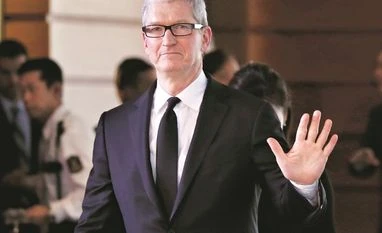While on the campaign trail last year, Donald J Trump lamented the loss of manufacturing jobs in the United States and set his sights on companies like Apple to help rectify the situation. “I’m going to get Apple to start making their computers and their iPhones on our land, not in China,” he said.
On Wednesday, Apple appeared to meet President Trump halfway.
While it did not announce a new manufacturing facility with thousands of manufacturing jobs, Apple, the world’s most valuable public company, said it planned to dedicate resources to American job creation with a $1 billion fund to invest in advanced manufacturing in the United States. The company said it would announce the first investment from its new fund later this month.
The fund “can be the ripple in the pond,” Timothy D Cook, Apple’s chief executive, said during an interview with CNBC in which he announced the new fund. “Those manufacturing jobs create more jobs around them because you have a service industry that builds up around them.”
In introducing the fund, Apple joined a growing list of companies that have said in recent months that they will add, promote or keep jobs — many of them related to manufacturing — in the United States.
Carrier, a furnace maker that had been excoriated by Trump for potentially outsourcing jobs to Mexico, decided to keep 800 of 1,400 jobs in Indianapolis. SoftBank, a Japanese company that has invested in many businesses worldwide, told Trump it would use a $100 billion technology fund to create 50,000 American jobs. This week, Infosys, a tech outsourcing company based in India, said it would hire up to 10,000 American workers.
Some critics have suggested the Trump administration is too focused on manufacturing, as opposed to more quickly cultivating service occupations — in the leisure and hospitality or health care industries, for instance.
But for the roughly two-thirds of Americans who lack a four-year college degree, manufacturing remains one of the few sectors that can deliver a middle-class income. According to the Bureau of Labour Statistics, the typical factory worker earns more than $26 an hour, compared with $14 an hour for the average hotel and food services employee.
Even if more manufacturing jobs are created, however, there may be too few Americans with manufacturing skills to fill them. LinkedIn’s most recent monthly report on employment trends found there were not enough people with manufacturing skills in areas like New York City, Los Angeles and Denver, which lack the industrial bases found in cities like Cleveland and Detroit. Many high school graduates avoided going into the sector in recent decades as it shed jobs, creating a labour shortage as older workers retire. Apple’s focus with its new fund is on a slice of the industry known as advanced manufacturing. That is a catchall term, but typically it involves the production of high-value-added products in sectors like technology, aerospace, automobiles, sustainable energy and medical equipment. In some cases, that means making much smaller batches than mass-production-oriented assembly lines churn out, or using robotics and 3-D printing to create bespoke items.
Cook’s announcement of the new fund came midway through his interview with Jim Cramer of CNBC, when he was asked what he was doing to create jobs. Cook answered that Apple gave back in job creation and that the company had asked itself, “How can we get more people to do advanced manufacturing in the United States?”
Cook did not address whether the fund was influenced by Trump’s policies and statements on manufacturing.
Asked by Cramer about working with the president, Cook said there were always issues to agree on and disagree on with any administration in any country. But “you look to find common ground and try to influence the things you don’t,” he said.
Mr. Cook added that Apple would announce initiatives to support its current employees and add to their ranks, and to aid the software developers who make apps for Apple’s phones, watches and computers.
Apple, which reported its quarterly earnings on Tuesday, had $257 billion in cash and marketable securities on its balance sheet as of April 1, so a $1 billion fund is relatively paltry for the company. Much of Apple’s cash is held overseas, but Mr. Cook told CNBC that the money the company was using for the fund is “U.S. money.”
An Apple spokesman said he did not have anything to add beyond what Mr. Cook said during the interview.
Apple buttressed the announcement of the $1 billion fund with a webpage focused on job creation late on Wednesday. On its site, Apple highlighted a 19-year track record of American job creation, including how the company had grown to 80,000 employees in the United States since 1998, from 5,000, in part thanks to its sprawling retail operation.
Joining the group
- Carrier decided to keep 800 of the 1,400 jobs in Indianapolis
- SoftBank said it would use a $100-billion technology fund to create 50,000 American jobs
- Infosys announced it would hire up to 10,000 American workers
©2017 The New York Times News Service
Unlock 30+ premium stories daily hand-picked by our editors, across devices on browser and app.
Pick your 5 favourite companies, get a daily email with all news updates on them.
Full access to our intuitive epaper - clip, save, share articles from any device; newspaper archives from 2006.
Preferential invites to Business Standard events.
Curated newsletters on markets, personal finance, policy & politics, start-ups, technology, and more.
)